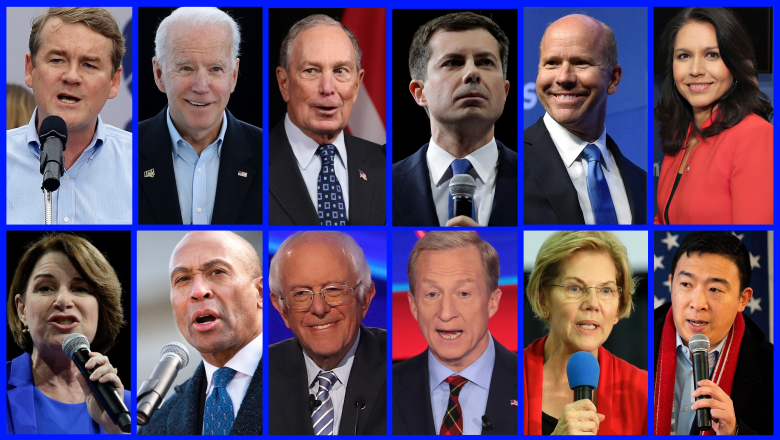
Getty These candidates could pick up delegates today.
The Iowa Democratic Caucus is going to be a quicker affair than previous years’ events. This year, voters are only allowed two preferential votes rather than multiple rounds that could last late into the night. So expect the results and the winner to be announced much sooner than previous years. The first results might be as early as 8 p.m. Central (9 p.m. Eastern.) But it’s possible that final results and a winner won’t be known until later in the evening, maybe around 11 p.m. Eastern (10 p.m. Central) or even later. Read on for more details.
Individual Precinct Caucuses Could Conclude as Early as 8 PM Central, But Results Won’t Be Until at Least 10 PM Central
The precinct caucuses begin at 7 p.m. Central sharp (8 p.m. Eastern.) If you’re not in line by 7 p.m., you can’t participate. Only one satellite caucus starts later at 7:45 p.m. Central. All the other satellite caucuses either start at 7 p.m. too or earlier in the day.
The caucus will consist of three parts, according to the Iowa Democratic Party (IDP).
- Introductory Business, including electing a secretary and chair, hearing a state party chair message, hearing messages from local officials, and sometimes local candidates.
- Presidential Preference Voting, which includes a second vote to realign non-viable candidates’ voters. This is when delegates to the County Convention are elected.
- Party Business, which includes electing people to the county central committee and discussing platforms for the county convention.
Although an exact time when the results will be announced isn’t known, Brookings estimated it will be around 11 p.m. Eastern on February 3 or 10 p.m. Central. NPR noted that the caucuses are actually expected to just last an hour, with some ending at 8 p.m. Central (9 p.m. Eastern.)
In the past, the results have come in between 12 a.m. and 1 a.m. Eastern. But in the past, the caucuses were allowed to have as many realignment votes as they wanted, which could drag out the process quite a bit. This time around, each caucus can only have two votes total.
However, as of 9:17 p.m. Central (10:17 p.m. Eastern), the Iowa Democrat Party reported that results were taking longer than expected.
This delay is partly due to how many people are showing up to vote. So don’t be surprised if it takes a while for results to come in. Here’s the line of people waiting to register to vote or change their party affiliation at DSM-55. As long as they are in line by 7 p.m., they can vote in the caucus. So it was going to take some time just to get everyone registered.
When the caucuses close, we’ll get three official numbers from the IDP:
- The results of the first vote (first Presidential Preference)
- The results of the second and final vote (second Presidential Preference)
- And the “State Delegate Equivalency” (SDE)
Note that the Iowa Democratic Party does not declare a caucus winner, but simply presents results to the public along with the SDE number (which is the number of state delegates allotted per candidate, technically called the State Delegate Equivalency number.)
In other words, the SDE is an estimate of how many delegates each candidate will send to the state convention, based on the number of county delegates they receive, Vox explained. An approximate allocation of national convention delegates will also be reported once all precinct results are received, the IDP noted.
Most media publications will base the “winner” on who has the highest SDE. But even if someone doesn’t have the highest number this time, they might still pick up some delegates for the national convention in July.
Technically, tonight’s number determines how many delegates each candidate sends to the county convention in March. Then those votes will be used to estimate how many national convention delegates each candidate will ultimately get.
There are 1,681 precincts in total in Iowa.
In order to win the first ballot at the Democratic National Convention, a candidate needs a total of 1,991 pledged delegates. A total of 41 pledged national delegates are up for grabs in Iowa, CNN reported. Then there are eight additional unpledged delegates in Iowa, which include five members of the Democratic National Committee and three members of Congress. These unpledged PLEO delegates were previously known in 2016 as superdelegates. Unlike in 2016, they will only be able to vote at the Democratic National Convention if a candidate does not get a majority of votes on the first ballot at the DNC.
READ NEXT: When Are the Democratic Primary & Caucus Elections?